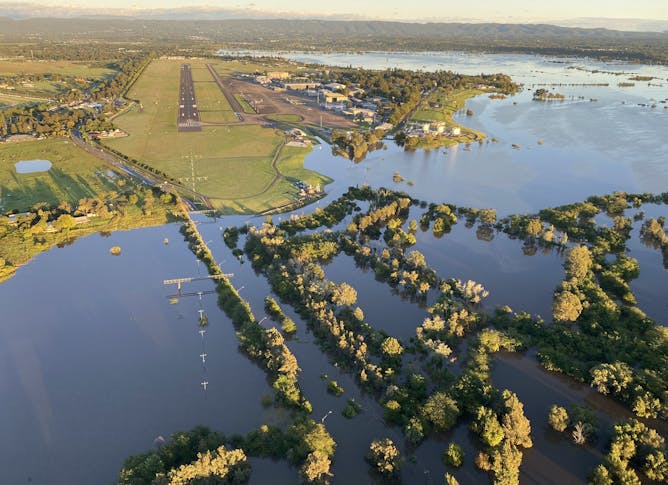|
|
|
|
Cast your mind back to this time a fortnight ago — remember all those dramatic scenes of flood damage to homes, infrastructure and livelihoods? The news cycle may have moved on but for those affected — many of whom were already experiencing disadvantage — the impact will be felt for years to come.
Today, Melissa Parsons and Martin Thoms ask what if, for a moment, we removed the humans and their structures from these tragic images — what would we see?
We would see a natural process of river expansion and contraction, of rivers doing exactly what they’re supposed to do from time to time. We’d see them depositing sediment across their floodplains. We’d see reproductive opportunities for fish, frogs, birds and trees. The floods would also enrich the soils.
“Floods can be catastrophic for humans, but they are a natural part of an ecosystem from which we benefit,” they write. “We must envision a new way of interacting with floodplains – these brilliant social-ecological systems that are not separate to rivers but rather part of the riverine landscape.”
Humans can live on and with floodplains, they argue, but the way we do that has to change.
|
Sunanda Creagh
Head of Digital Storytelling
|

|
|

AAP Image/AUSTRALIAN DEFENCE FORCE
Melissa Parsons, University of New England; Martin Thoms, University of New England
Floodplains are among the most productive ecosystems on the planet – they are biodiversity hotspots. That's in large part due to periodic flooding between different parts of a river-floodplain system.
|

Shutterstock
Joshua Zadro, University of Sydney; Brooke Nickel, University of Sydney; Giovanni E Ferreira, University of Sydney; Mary O'Keeffe, University of Sydney; Tessa Copp, University of Sydney
Health professionals should carefully consider the terms they use to avoid needless anxiety and unnecessary surgeries.
|

Lynn Bo Bo/EPA
Alexandra Wake, RMIT University; Abbas Valadkhani, Swinburne University of Technology; Alan Nguyen, RMIT University; Jeremy Nguyen, Swinburne University of Technology
A new interdisciplinary study provides a grim warning to dictators and despots, and even leaders in democracies. Curbing press freedoms may irreversibly damage the economy.
|

Scott Howes/EPA
Amy Nethery, Deakin University; Umut Ozguc, Deakin University
Australia has a long history of incarceration of migrants, Indigenous people and those considered 'enemies' of the state. This has formed a 'template' for modern-day quarantine and detention policies.
|

AAP/Joel Carrett
Peter McNeil, University of Technology Sydney
The sudden death of the designer at 78 is a huge blow to the industry, losing a proud feminist pioneer.
|

Shutterstock
Rob Brooks, UNSW
If both people like and trust each other enough to kiss, the good shared feelings they get makes them more likely to stay together.
|

Shutterstock
Elisa Bone, The University of Melbourne
Treating online education as a cheap alternative to lectures will be a mistake. At first universities will probably have to allow more preparation time and invest more in training and technology.
|
|
Bruce Isaacs, University of Sydney
In this 1970 Italian classic, director Bernardo Bertolucci uses the camera frame to throw the audience off-kilter again and again.
|
| |
Featured jobs
|
|
|
Featured Events & Courses
|

|
Parkes Place, Canberra, Australian Capital Territory, 2600, Australia — National Library of Australia
|

|
Level 21, 15 Broadway,, Ultimo, New South Wales, 2007, Australia — University of Technology Sydney
|

|
online, Perth, Western Australia, 6000, Australia — University of Western Australia
|

|
Level 21, 15 Broadway, Ultimo, New South Wales, 2007, Australia — University of Technology Sydney
|
|
|
|
| |
| |
| |
| |
| |
|
|
|
|
|
|
|